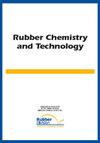金属有机骨架:智能替代传统纳米填料提高SBR纳米复合材料力学性能和热稳定性
IF 1.5
4区 工程技术
Q4 POLYMER SCIENCE
引用次数: 2
摘要
据我们所知,金属有机骨架(MOF)是一种多孔网状结构,首次被用作橡胶的增强填料。对2-氨基对苯二甲酸与氯化铝六水合物溶剂热反应合成的MOF进行了表征,并将其作为补强填料引入SBR中。参照SBR-纳米氧化铝复合材料(SBR-nAl),对分散良好、热稳定的纳米MOF复合材料(SBI-MOF)的性能进行了比较研究。SBR-MOF在机械上比SBR-nAl更坚固。在10phr负载下,SBR-MOF的拉伸强度比原始SBR复合材料提高130%,断裂伸长率比SBR-nAl提高50%。SBR-MOF的热性能和动态力学性能均优于SBR-nAl复合材料。高度多孔的有机骨架有利于增强聚合物链在界面处的缠结。通过扫描电子显微镜评价了有机骨架对分散性和相容性的有效性。分散度研究基本上支持了整体性能的提高。为了证实MOF在橡胶基体中的优越性,将SBR-MOF的拉伸性能与填充有纳米二氧化硅、纳米二氧化钛以及具有相容剂的纳米二氧化硅和纳米氧化铝的SBR复合材料进行了比较,从而证明了一种引入橡胶工业的有前途的纳米填料。本文章由计算机程序翻译,如有差异,请以英文原文为准。
METAL-ORGANIC FRAMEWORK: A SMART REPLACEMENT FOR CONVENTIONAL NANOFILLERS FOR THE ENHANCEMENT OF MECHANICAL PROPERTIES AND THERMAL STABILITY OF SBR NANOCOMPOSITE
To the best of our knowledge, for the first time, metal-organic framework (MOF), a porous reticular structure, has been tried as a reinforcing filler for rubber. A MOF synthesized by solvothermal reaction between 2-aminoterephthalic acid and aluminum chloride hexahydrate was characterized and incorporated as reinforcing filler in SBR. A comparative investigation on the properties of the well-dispersed, thermally stable nano-MOF composite (SBR-MOF) was carried out with reference to SBR–nano alumina composite (SBR-nAl). The SBR-MOF was mechanically more robust than SBR-nAl. The SBR-MOF showed 130% improvement in tensile strength over the pristine SBR composite and 50% better elongation at break than SBR-nAl at 10 phr loading. The thermal and dynamic mechanical properties of SBR-MOF are superior to SBR-nAl composite. The highly porous organic framework was favorable for the enhanced entanglement of polymer chains at the interface. The effectiveness of the organic framework on the dispersion and compatibility was evaluated by scanning electron microscopy. The dispersion studies substantially supported the overall property enhancement. To substantiate the superiority of MOF in the rubber matrix, the tensile properties of SBR-MOF were compared with SBR composites filled with nano silica, nano titania, as well as nano silica and nano alumina with a compatibilizer, thereby documenting a promising nanofiller for introduction into the rubber industry.
求助全文
通过发布文献求助,成功后即可免费获取论文全文。
去求助
来源期刊

Rubber Chemistry and Technology
工程技术-高分子科学
CiteScore
3.50
自引率
20.00%
发文量
21
审稿时长
3.6 months
期刊介绍:
The scope of RC&T covers:
-Chemistry and Properties-
Mechanics-
Materials Science-
Nanocomposites-
Biotechnology-
Rubber Recycling-
Green Technology-
Characterization and Simulation.
Published continuously since 1928, the journal provides the deepest archive of published research in the field. Rubber Chemistry & Technology is read by scientists and engineers in academia, industry and government.
 求助内容:
求助内容: 应助结果提醒方式:
应助结果提醒方式:


